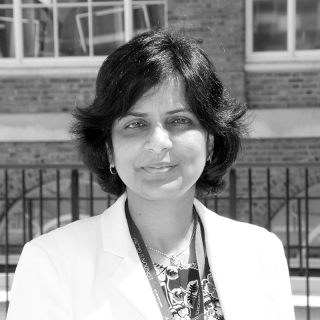Spotlight on Dr Priti Parikh - Associate Professor in the in the Bartlett School of Sustainable Construction

I am an Associate Professor and head the Engineering for International Development (EFID) Centre in the Bartlett. Our research looks at water, sanitation and energy infrastructure solutions for vulnerable communities in developing countries.
How long have you been at UCL and what was your previous role?
I have been at UCL for 10 years now. Before that I worked in the engineering industry for 15 years in UK and India on delivering infrastructure projects on the ground.
Tell us about something you’re working on at UCL that is supporting the SDGs
I lead a portfolio of research projects with the support of my amazing colleagues including Dr Pascale Hoffman, Professor Monica Lakhanpaul, Dr Loan Diep, Dr Luiza Campos, Dr Ine Steenmans, Dr Kerry Bobbins, Dr Lucila Carbonell, Ms Maria Jose and many others. Our interdisciplinary team has been evidencing links between infrastructure and SDGs. Notable examples include our collaboration with eThekwini Municipality funded by UCL Grand Challenges and Global Engagement Office. In this project we are working with government officials to identify links between sanitation and SDGs for Durban to facilitate collaboration and monitoring of targets across government departments. We are also working with Water Aid to co-develop a ministerial policy brief highlighting the importance of sanitation action and investment to meet SDG Targets.
Beyond work, which of your everyday activities contributes most to one or more of the SDGs?
I hope that some of my science communication work and getting the youth excited about the environment will contribute to the SDGs. I am taking part in a charity show in December called Nine Lessons and Carols for Curious People, hosted by Radio 4’s Robin Ince, that blends science, music and comedy. All profits from the shows go to charities like COVAX and Maytree. Watch my comic shambles as I talk about poo and climate.
And what do you do that has the most detrimental impact on the Goals?
My travel is detrimental to the goals as most of my research projects are international. With COVID, we have switched to virtual working, stronger collaboration with local partners and are developing tools for effective remote data collection and public engagement. I now intend to continue with this and reduce international travel where I can.
In your opinion, which of the SDGs is the most important for humanity to address?
I think SDG6 (Water and Sanitation) and SDG7 (Energy) are vital to address. Infrastructure can be used as a lever to improve health, education, livelihood creation and tackle climate change. My doctorate research demonstrated that infrastructure can lead to a multiplier effect by improving living conditions, preserve the environment and increase opportunities for citizens to be productive and engaged.
If there was an 18th Goal, what should it be?
Sanitation absolutely – currently water and sanitation are combined into one goal (SDG6) but the problem is that most of the resources are targeted to water. Sanitation as a sector suffers from under investment.
If you could bring in one law or societal shift to help the UK address the SDGs, what would it be?
Consume less and be frugal – that would also address climate concerns. Growing up in India, there were practices around reusing clothes and newspapers, which I would like to see more of once again.
What is the biggest challenge to the world achieving the Goals by 2030?
More action and investment needed in resource challenged settings. Back up good policies with action on the ground.
What would it surprise people to know about you?
I read palms, just knock on my door with tea and chocolate cake.
 Close
Close

